Yom Kippur
| The meaning of the Hebrew name: |
Day of Atonement. |
| Meaning of the holiday: |
A fast day of prayer and collective confession.
Only once a year on Yom Kippur, the High Priest (nobody else) may enter the Holy of Holies, and meet there the glory of the LORD (the Shekinah). (Hebrews 9,7)
The High Priest makes atonement for himself and for the people of Israel (Leviticus 16) |
| Pronunciation: |
Some say yohm kee-poor, and some yohm kipper. |
| Scripture Reference : |
Leviticus 16 / Numbers 29,7-11 / Isaiah 57,14 - 58,14 |
| Date: |
Tishrei 10 |
| Foods: |
None. It's a fast day! Well, families do have traditions about what to eat when the fast is over, like a dairy meal, but there's nothing universal. Children under age 13 and other people whose health might be harmed don't fast. |
| Activities: |
In addition to all the negatives involved in fasting—not eating, not drinking, not washing, not wearing leather, not having sexual relations—there are a lot of things to do on Yom Kippur. Mainly there are a lot of traditional prayers and things to read in the synagogue. For a lot of Jews who aren't very observant, Yom Kippur is special because it's the day they go to memorial services, called Yizkor, to honor dead relatives. |
| Holiday symbols and symbolism: |
White clothing, sneakers worn with dress clothes (because of the prohibition on leather). |
| Greeting: |
You can say Happy New Year or "have White clothing, sneakers worn with dress clothes (because of the prohibition on leather). an easy fast." Some say Shanah Tovah, which is Hebrew for Happy New Year. The more targeted greeting for Yom Kippur is Gamar hatimah tovah--a good completion to your inscription in the book of life. |
| Fulfillment : |
Through Jesus’ death at the cross, the way to the Father is free for everybody at anytime: With a loud cry, Jesus breathed His last. The curtain of the temple was torn in two from top to bottom.
When Jesus will arrive on planet earth for the second time, He will come out of the Holy of Holies (heaven).
When He returns, beside other functions, He will come as the High Priest to His chosen people Israel |
| Scripture Reference : |
Mark 15,37-38 / Zechariah 12,10 |
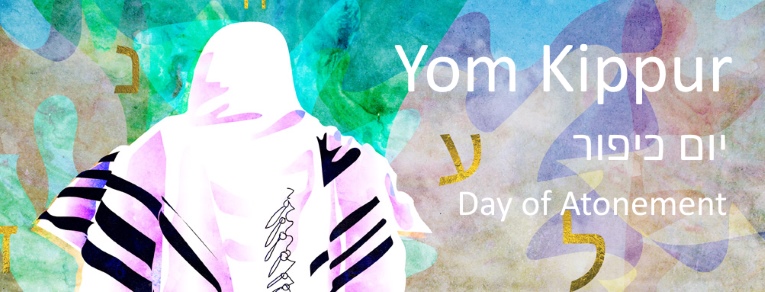
About Yom Kippur
The holiest day in the Jewish year (a fast day not a feast day), the Day of Atonement (Yom Kippur), is spent in fasting, prayer, and confession. This was one gracious day a year given by God that each individual could receive forgiveness. The high priest enters the holy of holies to make atonement for the nation by sacrificing an animal (Lev. 23:26-32). Jesus has provided our atonement, “for all have sinned and fall short of the glory of God…” (Rom. 3:23) and are justified freely by his grace through the redemption that came by Him.
Aaron shall bring the goat whose lot falls to the LORD and sacrifice it for a sin offering. But the goat chosen by lot as the scapegoat shall be presented alive before the LORD to be used for making atonement by sending it into the desert as a scapegoat. (Leviticus 16,9-10)
After a Jewish tradition, the scapegoat did return from the desert at Yom Kippur, which followed Jesus’ crucifixion.
After a Jewish tradition, the glory of the LORD was not present anymore in the Holy of Holies during the last 40 years before the destruction of the temple through Titus: Since Golgatha!
Since then, the crimson strip of wool tied to one of the scapegoat’s horns, did not turn white anymore!
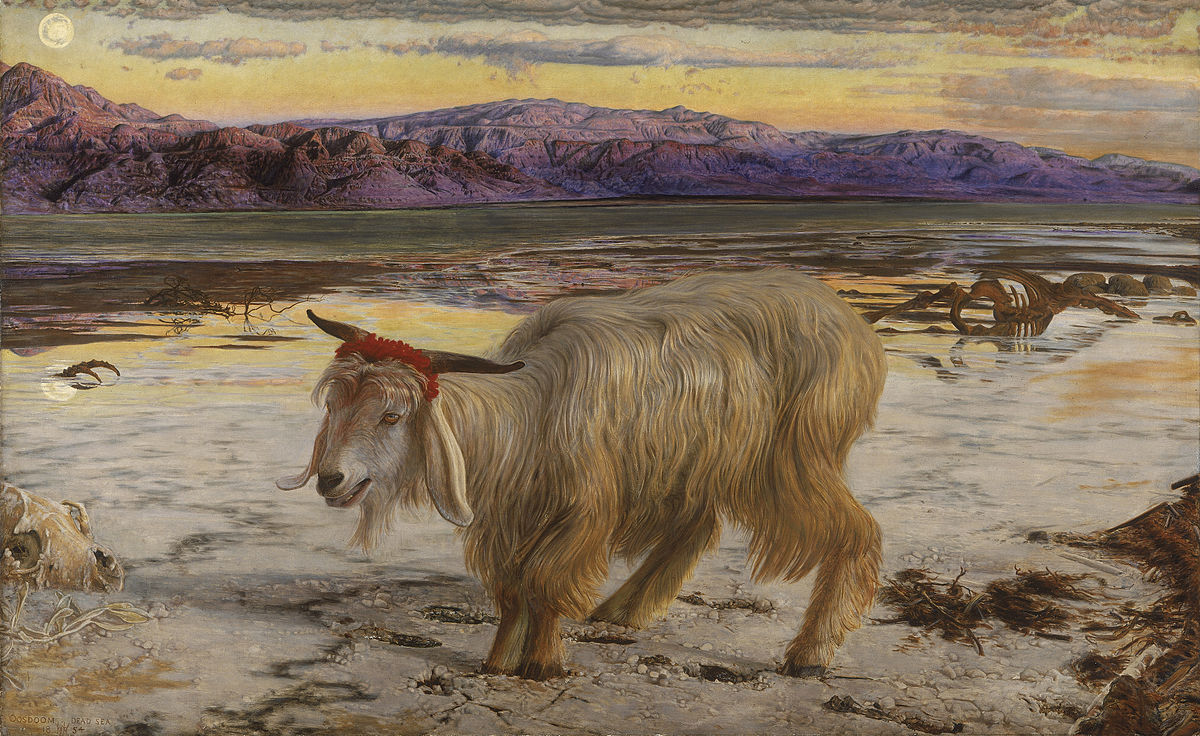 Prophetic Significance Prophetic Significance
The Day of Atonement is a divine rehearsal of the “Day of the LORD.”
This is when Jesus returns to the earth, wars with the armies of darkness in the Valley of Armageddon, and then judges the nations. Everything that is not afflicted in soul before Him will be cut off.
Revelation 19:11-16 (NKJV)
11 Now I saw heaven opened, and behold, a white horse. And He who sat on him was called Faithful and True, and in righteousness He judges and makes war.
12 His eyes were like a flame of fire, and on His head were many crowns. He had a name written that no one knew except Himself.
13 He was clothed with a robe dipped in blood, and His name is called The Word of God.
14 And the armies in heaven, clothed in fine linen, white and clean, followed Him on white horses.
15 Now out of His mouth goes a sharp sword, that with it He should strike the nations. And He Himself will rule them with a rod of iron. He Himself treads the winepress of the fierceness and wrath of Almighty God.
16 And He has on His robe and on His thigh a name written: KING OF KINGS AND LORD OF LORDS.
The Days In Between
Rosh Hashanah and Yom Kippur The ten days beginning with the Jewish New Year (Rosh Hashanah) and ending with the Day of Atonement (Yom Kippur) are known as the “Ten Days of Teshuvah” (you’ll sometimes see this translated as the “Ten Days of Repentance”) .
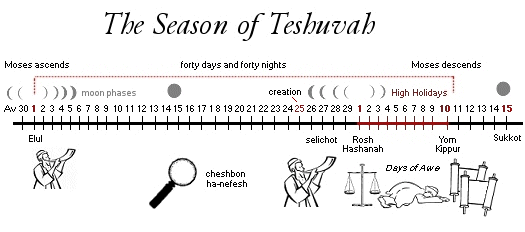 During this stretch of time, the tradition encourages all of us to think about who we may have harmed over the course of the last year, whether intentionally or by accident, and whether by word or by deed . We’re invited to take time to reach out to people personally and take responsibility for our mistakes . The idea is to talk privately with family members, friends or anyone else we feel we may have wronged . We do our best to admit our mistakes, seek forgiveness from those we have hurt, and offer to make amends . This can be a really powerful exercise for families, including families with young kids . During this stretch of time, the tradition encourages all of us to think about who we may have harmed over the course of the last year, whether intentionally or by accident, and whether by word or by deed . We’re invited to take time to reach out to people personally and take responsibility for our mistakes . The idea is to talk privately with family members, friends or anyone else we feel we may have wronged . We do our best to admit our mistakes, seek forgiveness from those we have hurt, and offer to make amends . This can be a really powerful exercise for families, including families with young kids .
Day of Atonement (Yom Kippur)
The Lord spoke to Moses, saying, “On exactly the tenth day of this seventh month is the day of atonement; it shall be a holy convocation for you, and you shall humble your souls and present an offering by fire to the Lord. You shall not do any work on this same day, for it is a Day of Atonement, to make atonement on your behalf before the Lord your God.
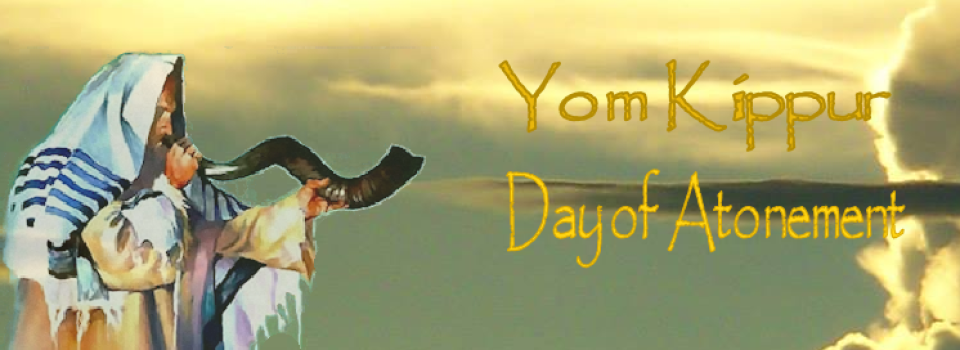
If there is any person who will not humble himself on this same day, he shall be cut off from his people. As for any person who does any work on this same day, that person I will destroy from among his people. You shall do no work at all. It is to be a perpetual statute throughout your generations in all your dwelling places. It is to be a Sabbath of complete rest to you, and you shall humble your souls; on the ninth of the month at evening, from evening until evening you shall keep your Sabbath” (Leviticus 23:26-32).
“He shall take the two goats and present them before the Lord at the doorway of the tent of meeting. Aaron shall cast lots for the two goats, one lot for the Lord and the other lot for the scapegoat. Then Aaron shall offer the goat on which the lot for the Lord fell, and make it a sin offering. But the goat on which the lot for the scapegoat fell shall be presented alive before the Lord, to make atonement upon it, to send it into the wilderness as the scapegoat. … for it is on this day that atonement shall be made for you to cleanse you; you will be clean from all your sins before the Lord. It is to be a Sabbath of solemn rest for you, that you may humble your souls; it is a permanent statute. So the priest who is anointed and ordained to serve as priest in his father’s place shall make atonement: he shall thus put on the linen garments, the holy garments, and make atonement for the holy sanctuary, and he shall make atonement for the tent of meeting and for the altar. He shall also make atonement for the priests and for all the people of the assembly. Now you shall have this as a permanent statute, to make atonement for the sons of Israel for all their sins once every year.” And just as the Lord had commanded Moses, so he did (Leviticus 16:7-10; 30-34).
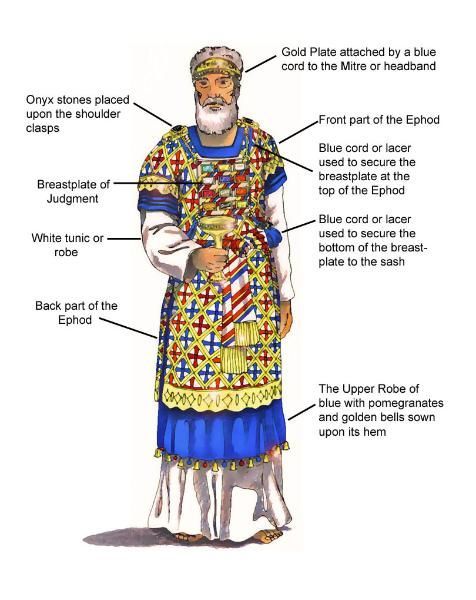 The Day of Atonement, or Yom Kippur, represents the day when the priest puts on special clothes and makes offerings to atone, or cleanse, the holy sanctuary, the temple, and the altar. He then makes atonement for the priests and the people. The day is solemn and serious. It is a day of complete rest and fasting with a goal of humbling the soul. The Day of Atonement, or Yom Kippur, represents the day when the priest puts on special clothes and makes offerings to atone, or cleanse, the holy sanctuary, the temple, and the altar. He then makes atonement for the priests and the people. The day is solemn and serious. It is a day of complete rest and fasting with a goal of humbling the soul.
As a holy day, it serves to remind us of the gravity and offense of sin. The eve of the Day of Atonement begins with the blast of a shofar.
Afterwards, the shofars are silent until next year.
Yom Kippur begins in the evening of the ninth day of the seventh month. In modern Judaism there is an important liturgical chant sung on this evening. It is called Kol Nidre, which in Hebrew means “All Vows.” It is a rescinding of vows: a cleansing of vows that were made, but remain unfulfilled and un-fulfillable. Kol Nidre originated in seventh century Spain, where Jews were tortured or burned unless they bound themselves, by oath, to cease from Jewish religious expression. Those Jews, whose constitutions could not rise to suffering an excruciating and fearful death, renounced their Judaism. When better days came along, the Kol Nidre was created to absolve them of their rash vows and re-open full fellowship in the community. To me it catches the spirit of Jesus’ parable of the prodigal son. It is the full expression of forgiveness to one who forsook the community, but later came to his senses.
If Kol Nidre is the open door to renewed fellowship for the repentant apostate, those who treat the day lightly stand in the path of destruction. As  the Lord says, “As for any person who does any work on this same day, that person I will destroy from among his people.” Those who would work on the day when sin is to be confronted, fail to understand the seriousness of sin. It is to say, by my actions, that sin is not a problem for me. the Lord says, “As for any person who does any work on this same day, that person I will destroy from among his people.” Those who would work on the day when sin is to be confronted, fail to understand the seriousness of sin. It is to say, by my actions, that sin is not a problem for me.
Before the destruction of the temple, the atonement of the people involved two goats. By casting lots the priest chose between the goats. One was chosen for the Lord (hwhyl, l’yhvw) the other was chosen for Azazel (lzazul, l’azazel) (usually translated as scapegoat). The priest transferred the sins of the people onto the scapegoat and then it was driven into the wilderness. The first goat paid the penalty of the people’s sin, the second took the sin away. The ancient Jews considered the two goats to be two halves of a single sacrifice. Therefore, they would select two goats that very closely resembled each other.
The reference to Azazel only appears in Leviticus 16. It appears no where else in the scriptures. Although it is typically translated as “scapegoat,” the actual language suggests a being for which this goat is chosen. As one goat is chosen “for (to) the Lord,” so the other is chosen “for (to) Azazel.” Who or what is Azazel?
There is only one extra-biblical reference to him: the Book of Enoch. It identifies him as one of the angels (as hinted by Genesis 6) who corrupted the earth. An intriguing connection to the Day of Atonement occurs in Enoch chapter 10.
“And again the Lord said to Raphael: ‘Bind Azazel hand and foot, and cast him into the darkness: and make an opening in the desert, which is in Dudael, and cast him therein. And place upon him rough and jagged rocks, and cover him with darkness, and let him abide there forever, and cover his face that he may not see light. And on the day of the great judgment he shall be cast into the fire.’”
How reliable might this reference be? This is a hard question. The Book of Enoch does not have the antiquity it claims, but it is still thousands of years closer to the meaning of Azazel than we have anywhere else. The fact that Jude quotes from it (Jude 14, 15), at least, attests to its cultural pertinence. On the other hand, the Septuagint translation of Azazel, avpopompaiw| (“a carrying away”), is closer to the spirit of a “scapegoat.”
Nevertheless, the Enoch picture is intriguing. The goat “for (to) Azazel” is sent to the domain of Azazel in the wilderness. We have a picture of Israel’s sins taken away and cast into the abyss to await the final judgment.
Although the Day of Atonement is about the payment and removal of the sins of the nation for a year, it also looks forward to the day of Israel’s salvation. Note the thematic connections in the following 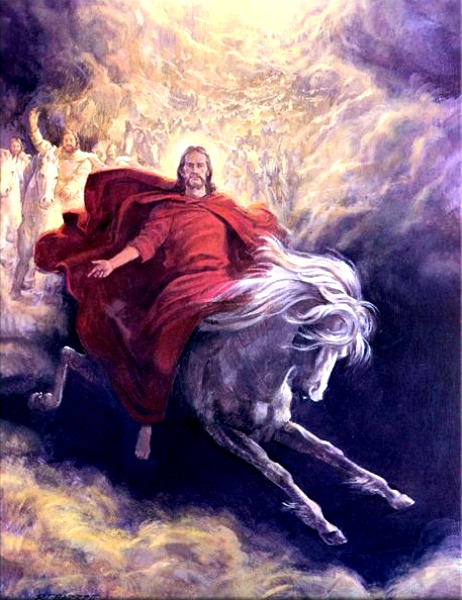 verses. verses.
- BEHOLD, HE IS COMING WITH THE CLOUDS, and every eye will see Him, even those who pierced Him; and all the tribes of the earth will mourn over Him. So it is to be. Amen (Revelation 1:7).
- “I will pour out on the house of David and on the inhabitants of Jerusalem, the Spirit of grace and of supplication, so that they will look on Me whom they have pierced; and they will mourn for Him, as one mourns for an only son, and they will weep bitterly over Him like the bitter weeping over a firstborn” (Zechariah 12:10).
- “I kept looking in the night visions, And behold, with the clouds of heaven One like a Son of Man was coming, And He came up to the Ancient of Days And was presented before Him. And to Him was given dominion, Glory and a kingdom, That all the peoples, nations and men of every language Might serve Him. His dominion is an everlasting dominion Which will not pass away; And His kingdom is one Which will not be destroyed (Daniel 7:13, 14).
- And then the sign of the Son of Man will appear in the sky, and then all the tribes of the earth will mourn, and they will see the SON OF MAN COMING ON THE CLOUDS OF THE SKY with power and great glory. And He will send forth His angels with A GREAT TRUMPET and THEY WILL GATHER TOGETHER His elect from the four winds, from one end of the sky to the other (Matthew 24:30, 31).
- For I do not want you, brethren, to be uninformed of this mystery—so that you will not be wise in your own estimation—that a partial hardening has happened to Israel until the fullness of the Gentiles has come in; and so all Israel will be saved; just as it is written, “THE DELIVERER WILL COME FROM ZION, HE WILL REMOVE UNGODLINESS FROM JACOB. THIS IS MY COVENANT WITH THEM, WHEN I TAKE AWAY THEIR SINS” (Romans 11:25-27).
First, Revelation 1:7 links two Old Testament Messianic prophecies: Zechariah 12:10 and Daniel 7:13, 14. That is, the day the Lord returns is the day that Israel receives “the Spirit of grace and supplication” and finds national salvation. Second, Matthew links these events to the blowing of a great trumpet (or shofar) that begins the Day of Atonement. Third, it is the day to which Paul, in Romans 11:25-27, looked ahead. As the goat chosen for Azazel takes away the sin from Israel, so according to Paul the coming of the Lord will take away the sins of Israel. The meaning of all this is that the future fulfillment of the Day of Atonement is the second coming of Jesus Christ on the earth and the salvation of Israel.
 Previous Rosh Hashana Previous Rosh Hashana |



